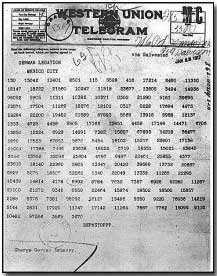Primary Documents - Zimmermann Telegram, 19 January 1917
 Between 1914 and the spring
of 1917, the European nations engaged in a conflict that became known as
World War I.
Between 1914 and the spring
of 1917, the European nations engaged in a conflict that became known as
World War I.
While armies moved across the face of Europe, the United States remained neutral.
In 1916 Woodrow Wilson was elected President for a second term, largely because of the slogan "He kept us out of war."
Events in early 1917 would change that hope. In frustration over the effective British naval blockade, in February Germany broke its pledge to limit submarine warfare. In response to the breaking of the Sussex pledge, the United States severed diplomatic relations with Germany.
In January of 1917, British cryptographers deciphered a telegram from German Foreign Minister Arthur Zimmermann to the German Minister to Mexico, von Eckhardt, offering United States territory to Mexico in return for joining the German cause. Zimmermann himself dispelled initial suspicions regarding the telegram's authenticity by giving a speech in which he confirmed its existence.
This message helped draw the United States into the war and thus changed the course of history. The telegram had such an impact on American opinion that, according to David Kahn, author of The Codebreakers, "No other single cryptanalysis has had such enormous consequences."
It is his opinion that "never before or since has so much turned upon the solution of a secret message." In an effort to protect their intelligence from detection and to capitalize on growing anti-German sentiment in the United States, the British waited until February 24 to present the telegram to Woodrow Wilson.
The American press published news of the telegram on March 1. On April 6, 1917, the United States Congress formally declared war on Germany and its allies.
Click here to read a 1921 commentary upon the consequences of the Zimmermann Telegram. Click here to read the reaction of the Japanese government to news of the telegram.
To the German Minister to Mexico
Berlin, January 19, 1917
On the first of February we intend to begin submarine warfare unrestricted. In spite of this, it is our intention to endeavour to keep neutral the United States of America.
If this attempt is not successful, we propose an alliance on the following basis with Mexico: That we shall make war together and together make peace. We shall give general financial support, and it is understood that Mexico is to reconquer the lost territory in New Mexico, Texas, and Arizona. The details are left to you for settlement...
You are instructed to inform the President of Mexico of the above in the greatest confidence as soon as it is certain that there will be an outbreak of war with the United States and suggest that the President of Mexico, on his own initiative, should communicate with Japan suggesting adherence at once to this plan; at the same time, offer to mediate between Germany and Japan.
Please call to the attention of the President of Mexico that the employment of ruthless submarine warfare now promises to compel England to make peace in a few months.
Zimmermann
(Secretary of State)
Source: Source Records of the Great War, Vol. V, ed. Charles F. Horne, National Alumni 1923
A Runner was a soldier who carried messages by hand.
- Did you know?
